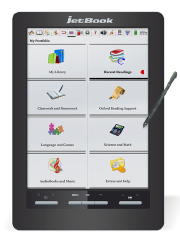ECTACO Info | Electronic textbooks in schools in Russia: Results of the Year
translate by Google.
Probably many have heard that a number of Russian schools conducted an experiment on introduction of electronic readers to replace paper books. The experiment involved 38 schools in nine regions of the country.
Why do it than not to have pleased a simple book to which we have become accustomed?
The explanation is simple. Now the average student carries a 5-6 books every day, and about 3 pounds of weight. Throw in another notebook, diary, any pens / pencils - and get is 4 and a half pounds. It's pretty impressive weight, which can adversely affect the health of schoolchildren, namely cause scoliosis. Previously, there was nothing to replace textbooks, but now such a device as an electronic reader quite a can handle it. Well, let's go back to the results of the experiment and learn how to behave these gadgets in the harsh realities of Russian schools. After all students - it's still children, and they are not always protective of the things.
The experiment involved e-readers with screens based on e-ink E-Ink of two types: ordinary black and white and experimental color. The first segment was presented with two models: PocketBook Pro 903 (1137 pieces) and Plastic Logic100 (894 pieces). Defended the honor of the second model Ectaco JetBook Color, the delivery of which was 166 units.
During the year students use these gadgets best proved itself PocketBook Pro, the percentage of its damage was 0.26%. At Plastic Logic 100 it is 7.83%, while the Ectaco JetBook Color with new experimental color display - 4.22%.
In fact, a very interesting story turned from Plastic Logic 100. In August 2011, the head of Rusnano Anatoly Chubais, Vladimir Putin presented an "education tablet", for some reason that's how he described the reader. Then Chubais emphasized the fact that the device uses a very durable, flexible plastic screen. So restless students will hardly bring the machine down. But as we can see by the results of the experiment, this is not the case. It's simple: the display can be really good and strong, but that case, motherboard, CPU, memory, battery, and so did not survive the operation of school children. Also said that in May 2012, Plastic Logic and RUSNANO (namely, the corporation is a major investor in the British company) stated that the model of Plastic Logic 100 is no longer produced, and added that the new models will not also be. Their main area of activity is the development of displays now on a plastic substrate, which they will offer to third parties.
It is believed that e-readers with displays based on electronic ink E-Ink are most suitable for use in schools. This is confirmed by 80% of the parents of those students who took part in the experiment. The fact that these screens are completely harmless to the eye. As to the benefits of readers include light weight, ease of use and the ability to take notes directly in the textbook (stress trace, highlight, etc.).
Federal Institute for Educational Development, based on the outcome of the experiment was to manufacturers of electronic readers and educational content some recommendations. Basically, everything is very clear. There is no sense to develop a school reader from scratch (as was the case with the Plastic Logic 100). They can become an ordinary e-reader, which can be purchased on the open market. And you can not worry that the device suddenly broken or vskroyutsya some flaws. These models and their specific technology for several years on the market. If they were not sufficiently reliable and convenient, they would not have sold like hot cakes.

Comments
Post a Comment